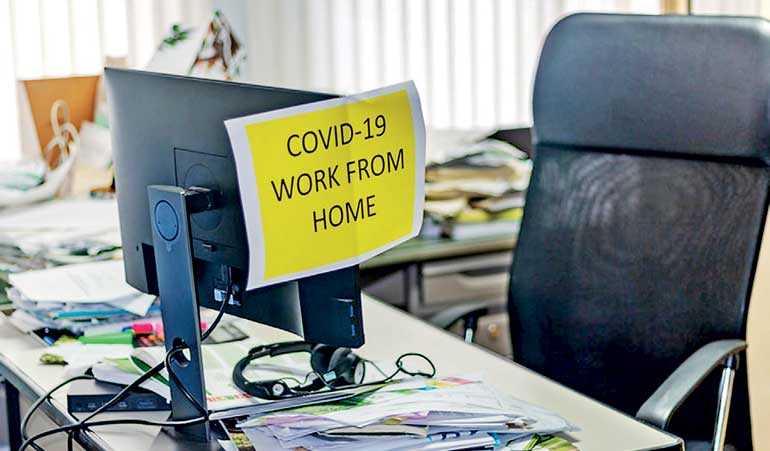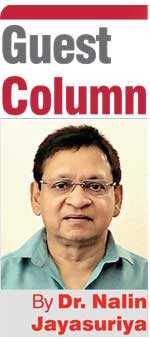Saturday Feb 28, 2026
Saturday Feb 28, 2026
Tuesday, 16 June 2020 00:00 - - {{hitsCtrl.values.hits}}

What this crisis has taught the corporate world is that, with the right technology in place, not everyone needs to be at the same place at the same time
It’s back after a century, ‘The Pandemic’. Pity that the WHO delayed in declaring the virus as a global pandemic. Many lives may have been saved if a timely declaration was made.
We hear of many organisations that are questioning their viability post-pandemic, especially those in the apparel, travel, hotel keeping, events and entertainment sectors. We also hear of companies accelerating their growth because their value propositions are in high demand; think of pharmaceuticals, medical practitioners, internet-enabled communication, collaboration tools and home delivery services. As a result of such factors, companies will differ in their resilience. It is important that organisations take steps now to map your probable position among the clientele/market when the pandemic eases.
What this crisis has taught the corporate world is that, with the right technology in place, not everyone needs to be at the same place at the same time. Online tele-conferencing, chats, discussions, digital marketing have all sped up the journey towards a digital economy. Even deals can now be inked digitally. This could become the norm. There are several consequences of this. Most meetings were conducted using Zoom, Duo, WhatsApp and Skype. All of these works up towards a change in the model of doing post-pandemic business.
Positioning during and after the pandemic
Many CEOs that I speak to respond by stating that they have to sit with their top team and come up with strategy to get back to business as usual, followed with getting the buy-in from all other staff. However, to make smart strategic decisions the CEO must understand market variations, conduct a situation analysis factoring in the indices that are more relevant to creating impact in their respective sector of business and then come up with the strategy for execution relevant to that particular environment. For example, “Who are you in the market, what role do you play in your eco-system and who are your main competitors? It is also important to know where the CEO and the company is headed.
Can you shut down your operations and reopen unchanged after the pandemic? Can you regain lost ground? Will you be bankrupt, or can you emerge as a market leader fuelled by developments during the lockdown?
Having an objective is only one part of the plan. What about the purpose? It is easy to see both these as having one meaning. However, in order to distinctly draw the difference, I choose an example, i.e., if I make an announcement to contest General Elections in order that I will genuinely look after the economic and welfare requirements of my constituents, that is my objective. What is my purpose? Well, my purpose is to acquire 50 acres of prime coconut land and a mansion for a home. Look around you and you will know what I am talking about. We generally voice our objective whilst, our purpose is withheld to ourselves.
Planning to bounce back?
A ‘plan’ is a projection of a course of action pointing the way to the position you hope to attain. It should explicate what you need to do today in order to achieve your objectives tomorrow. In the current context, the question is what you must do to get through the crisis and go back to business when it ends. A plan is a forerunner to a strategy. It is important, therefore, to remember that ‘strategy’ is a path to a planned destination. The lack of a plan only exacerbates disorientation in an already confusing situation. When drawing up the steps you intend to take, think broadly and deeply, and take a long view.
It may be useful to consider the following areas or factors before you start the planning process –
Does your vision and mission need a revisit?
Are you willing to throw out the beliefs and ‘ways of business practices’ you adopted before the pandemic and be courageous to try out new methods even though some aspects could be radical for change?
Define your competitive advantage.
Is the current workforce you have ideal to take the business forward?
Are you yet tolerant of the lavishness and duplication of effort that existed before COVID-19 breakout?
Are you brave to move from theory to what is pragmatic?
Are you ready to take a hard look at your business and business model with the determination to make changes required for post-pandemic sustainability?
Are you ready and willing to convert your HR managers from routine administrative and ‘personnel’ management to value adding people transformers where their KPIs carry at least two 25% weightage-bearing KPIs that add value to the top and bottom lines?
The management theorist Henry Mintzberg defined ‘strategy’ as the 5 Ps: Plan, Ploy, Pattern, Position, and Perspective. It may be useful to adopt these five indices when formulating the strategy, be it corporate or departmental.
Possible changes in culture and identity
Perspective means the way an organisation sees the world and itself. In all likelihood, your culture and identity will change as a result of the pandemic. A crisis can bring people together and facilitate a collective spirit of endurance — but it can also push people apart, with individuals distrusting one another and predominantly looking after themselves.
It’s crucial to consider how your perspective might evolve. How prepared was your organisation culturally to deal with the crisis? Will the ongoing situation bring your employees together or drive them apart? Will they see the organisation differently when this is over? Will your employees see you losing your heart in order to compromise with you brain to churn out ‘numbers’? Your answers will inform what you can achieve when the pandemic ends.
It is possible that companies may continue to roster employees and promote working from home. This is well and good provided tasks assigned are monitored to ensure that set timelines are met. This is a good way of knowing whether ‘working-from-home’ staff are really working. The advantage of working from home is that you are able to reduce overheads such as electricity, space, water and unnecessary people conflicts.
What new business products or services do you need to launch, run, and coordinate?
Your answers to these questions should point you to a set of activities for tackling your coronavirus-related problems. The challenge is to prioritise and coordinate initiatives that will future-proof the organisation.
Beware of starting numerous projects that all depend on the same critical resources, which might be specific individuals, such as top managers, or specific departments, such as IT. In the unfortunate event that you sign-off too many new initiatives, you could end up with a ‘war over resources’ that delays or derails your strategic response.
When comparing the management of the pandemic with other countries, we have fared quite well. Most of the ‘so called’ civilised, developed progressive countries in Europe, Scandinavia, Africa, Middle East, the US, UK and even Australia were having a great struggle with many deaths recorded. Sri Lanka has recorded 11 death as this article is released to the Press. This is a distinct advantage for us to gear ourselves to shine in the post-pandemic era. Most forward-looking companies have been doing their homework getting their companies up to speed in organising themselves to launch out with confidence.
Preparation to execute plans and projects?
You need to assess your organisation’s preparedness. Are you ready and able to accomplish the business activities/projects you have outlined, particularly if much of your organisation has shifted to remote work? We see big differences in preparedness at the individual, team, organisation, and national levels. The resources at hand, along with the speed and quality of decision-making processes, vary greatly and the differences will determine who achieves and who falls short of success.
It is prudent to be aware that consumers will remember how you acted/reacted during the crisis. Raising prices during a shortage, for example, could have a significant effect on your customer relationships going forward. We had a situation where a well-known home delivery company in Sri Lanka raised prices to an astonishing level when delivering food items to homes. This company came under major public criticism.
A prospect to succeed
Time is now opportune to assess your cadre and develop a healthy dissatisfaction with excess staff. Right-sizing or deployment is becoming the order of the day. Some companies have pruned by letting staff go. The performance management and appraisal will become more meaningful now than ever before because the company needs to maintain, nurture and grow those persons who have dexterity and potential for higher responsibility and accountability. The formula may become “half the people, paid twice as much and working three times more”.
The coronavirus has had unprecedented impacts on the world — and a relapse could occur, which will ruin us if we are not alert and protect ourselves. The front-liners are us and we must do all we can to be well and safe. Social distancing became a comedy at a recent funeral of a politician where hundreds gathered at several geographical locations to mourn. Shockingly, some were even without face masks. We however must not foolishly take that incidence as a precedence, but always do what is right and safe.
Companies must act today if they are to bounce back in the future. Doing so will help the world as a whole recover — and, we hope, become more resilient in the process.
(The writer is the Chairman of McQuire Rens Global Consulting Ltd. He has held Regional Responsibilities of two Multinational Companies of which one is a Fortune 500 Company. He has carried out Consultancy, Executive Coaching and Training assignments for organisations in Dubai, Maldives, Bangladesh, India, Singapore, Malaysia, Indonesia and Australia. He has been a Consultant to the UNDP, Ceylon Electricity Board, Sri Lankan Airlines, Airport & Aviation Services, SLTPB (Ministry of Tourism and was the co-consultant to set up the Public Utilities Commission of Sri Lanka (PUCSL), the first multi-sector regulatory agency in Asia and, several public and private sector organisations including MNCs. Dr. Jayasuriya has led Consultancy Assignments for the World Bank, Asian Development Bank, Institute of World Problems (USA) and PricewaterhouseCoopers. He is a much sought-after business consultant, coach and corporate management trainer in Sri Lanka.]